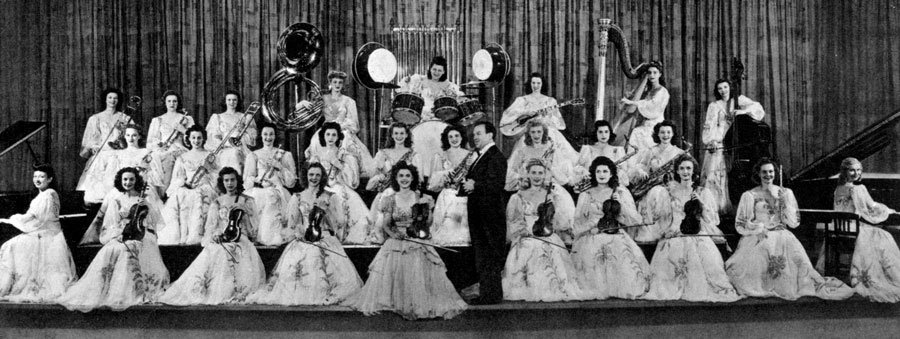Sherrie Tucker’s Swing Shift: “All-Girl” Bands of the 1940s seeks to challenge the dominant swing discourse, where all-women bands are infrequently mentioned, and to bridge that gap by finding a way to bring them into the discourse (pp. 4). Tucker chooses to pursue this through oral history, a practice of which she openly talks about the pitfalls. She writes: “There is a temptation to use oral histories as authenticating sound bites….If, however, we thinking of oral histories as events in themselves rather than as clear channels to the ‘true story,’ then we can begin to see how they relate to specific contexts” (pp. 26). How does Tucker endeavor to go about this? She sees her strategy as working within five main categories: foregrounding women in the Swing Era, exploring gender (not just band history), highlighting women who place themselves in jazz history, examining the physical act of travel, and working to complicate mentions of gender in jazz and swing history (pp. 27–29).
I do think that Tucker is successful in her strategy to foreground the stories of women during the Swing Era and to complicate constructions of gender during the 1930s and 1940s; she does wonderful work discussing how women’s performed femininity was linked to their work within the bands during their actual performances —- from the very instruments they played, to the clothes they wore, and the way in which society framed them (thinking here of show titles like “Hour of Charm,” suggesting feminine magnetism). Where I especially think she succeeds is in her discussion of the physical act of travel in Part II: Road Hazards, where she writes about various bands, such as the International Sweethearts of Rhythm, and how race affected their travels through Jim Crow South (pp. 163).

Returning to her definition of oral history established in the introduction, that oral histories should be seen as “events in themselves,” I do think that Tucker stays true to this definition in her later essay, “When Subjects Don’t Come Out.” The article explores exactly what’s in its title: What happens when an oral history subject doesn’t come out? This was especially pertinent when dealing with the women interviewed in Swing Shift, as they broke gendered expectations in many ways, it was expected that they might break heterosexual expectations as well. I enjoyed her phrasing that sexuality is “topic and nontopic, messily present and urgently denied. You are left with too much and nothing at the same time” (pp. 296). Keeping in mind that she wants to look at oral histories as events rather than sound bites affirming or contradicting a narrative, what can she do if an oral history remains vague and uninterpretable?
Tucker writes about many encounters with women who insinuate queerness in some way, referring to a joint checking account or the number of bedrooms within an apartment (pp. 299). Tucker puzzles over what to do when encountering queerness in this way, both reading into language in encounters while still respecting the privacy of her subjects. Personally, she had me puzzling even further about what types of queerness are even visible in the historical record. I was thinking a lot about queer people on the asexual or aromantic spectrum and how their histories might be perceived by a curious oral historian. There’s a gaping absence of histories written on asexuality/aromanticism, and perhaps that’s because they themselves often show up as subversions of traditional notions of queer partnerships —— perhaps an absence of a history of sexual relationships, or the presence of a queer-platonic relationship that could masquerade as a friendship in the historical record. Tucker’s article was in the end a bit more thought-provoking to me than Swing Shift was, although both did re-emphasize to me the importance of honoring the whole personhood of an interviewee. I just wish that she might have included some of the thoughts in her article into her book, to complicate her process and give a clearer picture of it.
References
Tucker, Sherrie. Swing Shift: “All Girl” Bands of the 1940s. Durham and London: Duke University Press, 2000.
Tucker, Sherrie. “When Subjects Don’t Come Out.” In Queer Episodes: In Music and Modernity, edited by Sophie Fuller and Lloyd Whitesell. Urbana and Chicago: University of Illinois Press, 2002.
Be First to Comment